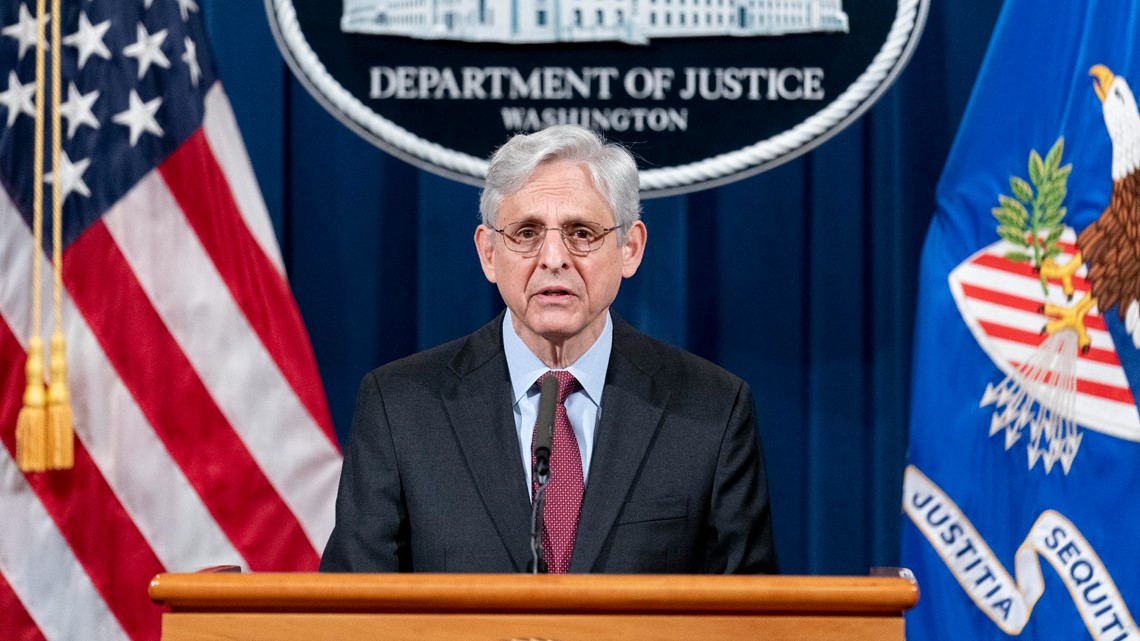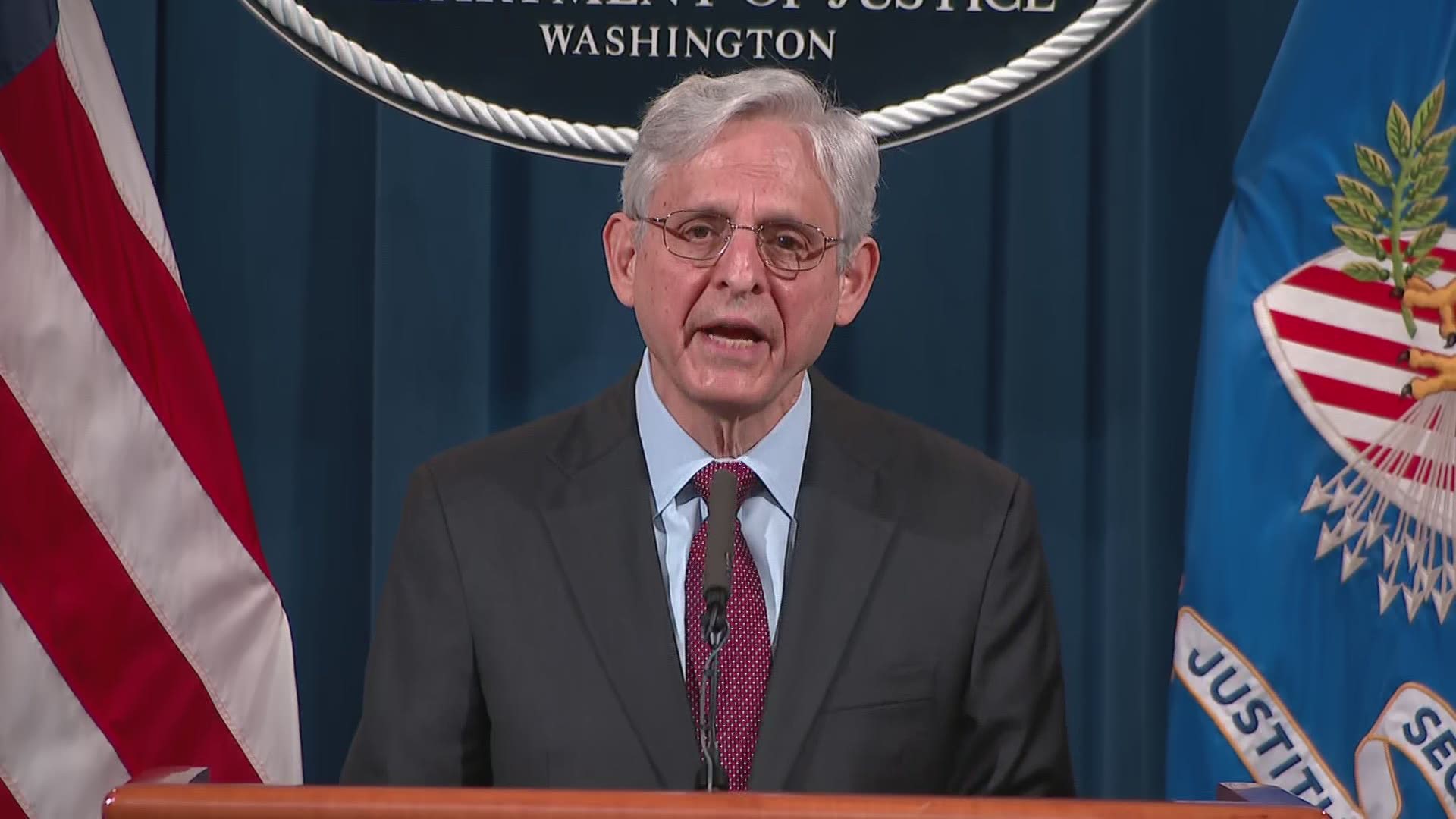WASHINGTON — The Justice Department is opening a sweeping investigation into policing practices in Minneapolis after a former officer was convicted in the killing of George Floyd there, Attorney General Merrick Garland announced Wednesday.
The announcement comes a day after former officer Derek Chauvin was found guilty of murder and manslaughter in Floyd's death last May, setting off a wave of relief but also sadness across the country. The Black man's death prompted months of mass protests against policing in the U.S.
The Justice Department is already investigating whether Chauvin and the other officers involved in Floyd's death violated his civil rights.
"Yesterday’s verdict in the state criminal trial does not address potentially systemic policing issues in Minneapolis," Garland said.
The investigation announced Wednesday is known as a “pattern or practice" — examining whether there is a pattern or practice of unconstitutional or unlawful policing — and will be a more sweeping probe of the entire police department and may result in major changes to policing there
It will examine practices used by police, including use of force and force used during protests, and whether the department engages in discriminatory practices. It will also look into the department’s handling of misconduct allegations and its treatment of people with behavioral health issues and will assess the department's current systems of accountability, Garland said.
It’s unclear whether the years under investigation will begin when Floyd died or before.


Floyd, 46, was arrested on suspicion of passing a counterfeit $20 bill for a pack of cigarettes at a corner market. He panicked, pleaded that he was claustrophobic and struggled with police when they tried to put him in a squad car. They put him on the ground instead.
The centerpiece of the case was bystander video of Floyd, handcuffed behind his back, gasping repeatedly, “I can’t breathe,” and onlookers yelling at Chauvin to stop as the officer pressed his knee on or close to Floyd’s neck for what authorities say was about 9 1/2 minutes, including several minutes after Floyd’s breathing had stopped and he had no pulse.
Floyd's death May 25 became a flashpoint in the national conversation about the deaths of Black Americans at the hands of law enforcement and sparked worldwide protests.
At trial, Chauvin's defense attorney persistently suggested Chauvin’s knee wasn’t on Floyd’s neck for as long as prosecutors argued, suggesting instead it was across Floyd’s back, shoulder blades and arm.
The decision to announce a sweeping Justice Department investigation comes as President Joe Biden has promised his administration would not rest following the jury's verdict in the case. In a Tuesday evening speech, he said much more needed to be done.


“‘I can’t breathe.’ Those were George Floyd’s last words,” Biden said. “We can’t let those words die with him. We have to keep hearing those words. We must not turn away. We can’t turn away.”
The Justice Department had previously considered opening a pattern or practice investigation into the police department soon after Floyd’s death, but then-Attorney General Bill Barr was hesitant to do so at the time, fearing that it could cause further divisions in law enforcement amid widespread protests and civil unrest, three people familiar with the matter told the AP.
Governor Tim Walz statement in response to DOJ investigation:
“Following the murder of George Floyd, I called for investigation into the Minneapolis Police Department. Last June, the Minnesota Department of Human Rights took up that call, immediately launched a civil rights investigation, and obtained a groundbreaking temporary restraining order against the Minneapolis Police Department and the City of Minneapolis. The state’s investigation continues and, now, under the leadership of President Biden and Attorney General Garland the United States Department of Justice is also answering the call. I welcome the federal government’s involvement in this important work, and I look forward to reviewing the results of both investigations as we work to rebuild trust between law enforcement and the communities they serve.”
Lieutenant Governor Peggy Flanagan released the following statement:
“While the trial of Derek Chauvin is over, the grief and anger ignited by the murder of George Floyd did not emerge from a vacuum. The issue of systemic racism in policing did not begin or end with one officer, but is instead about a pattern of behavior, a culture that continues to go unchecked. I am proud of the ongoing work of the Minnesota Department of Human Rights, under the leadership of Commissioner Rebecca Lucero, to identify and ultimately address the practices, policies, and civil rights violations that led to the death of George Floyd. I welcome the investigation by the United States Department of Justice as we work at all levels of this system, top to bottom, to build a state where everyone is safe, valued, and protected. We have tremendous work to do.”
Commissioner of the Minnesota Department of Human Rights Rebecca Lucero released the following statement:
"Our ongoing civil rights investigation into systemic racial discrimination quickly resulted in immediate changes. The Department of Justice's focus on constitutional claims complements the Minnesota Department of Human Rights' investigation. Together, these pattern or practice investigations will provide comprehensive and cohesive information needed to systemically shift the infrastructure to build a stronger Minneapolis."
Minneapolis City Council statement regarding the DOJ Investigation:
“We fully support the Department of Justice investigation of the Minneapolis Police Department. As we did when the Minnesota Department of Human Rights brought a similar civil investigation, we welcome the opportunity for the Department of Justice to use the full weight of its authority to hold the Minneapolis Police Department accountable for any and all abuses of power and harms to our community and stand ready to aid in this process as full partners.
The City Council’s oversight of the Minneapolis Police Department has been historically constrained by the City Charter and state law and we welcome new tools to pursue transformational, structural changes to how the City provides for public safety. We look forward to doing this critical work with every tool available.”
Minneapolis PD and Chief Medaria Arradondo statement on DOJ probe:
"Chief Arradondo welcomes this investigation. He, and the department, will cooperate fully. The Chief understands that the intent of this inquiry is to reveal any deficiencies or unwanted conduct within the department and provide adequate resources and direction to correct them. The Chief has been insistent that he wants to make the MPD the best department possible. With the assistance of the Department of Justice, the Chief believes he will have additional support, some of which he has been seeking over the last three years, to pursue changes he would like to see in his department.
The Department of Justice has extensive experience with these types of investigations. They are well versed in law enforcement techniques, training and best practices among today’s law enforcement agencies.
“I look forward to sharing the great work done by our teams, day in and day out, with the Department of Justice and getting their feedback on how we can serve our communities even better,” said Chief Arradondo."
Minnesota Sens. Amy Klobuchar and Tina Smith on DOJ Investigation:
“George Floyd should be alive today. Nothing will bring him back to us, but the verdict is a first step towards accountability. We know that law enforcement officers work within a bigger system, which is why we called for the Department of Justice to conduct an investigation into the patterns and practices of racially discriminatory policing in Minneapolis. We commend the Department of Justice’s decision to open this investigation, and we encourage them to coordinate with the ongoing investigation by the Minnesota Department of Human Rights.
Through both of these efforts, we are hopeful to make meaningful progress. These investigations alone will not solve systemic issues, which is why we won’t stop fighting to pass police reform legislation to hold officers accountable for misconduct, increase transparency in policing practices, and ban dangerous police practices like chokeholds and no-knock warrants.”

